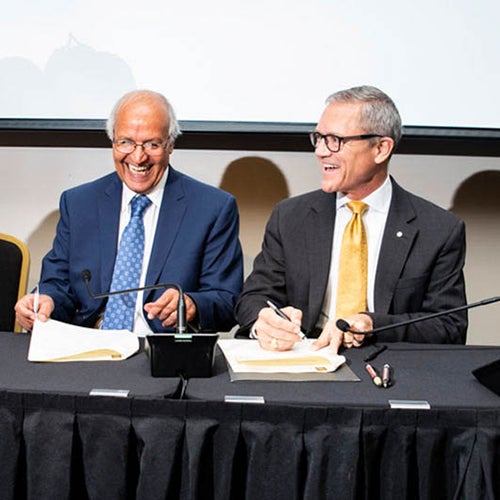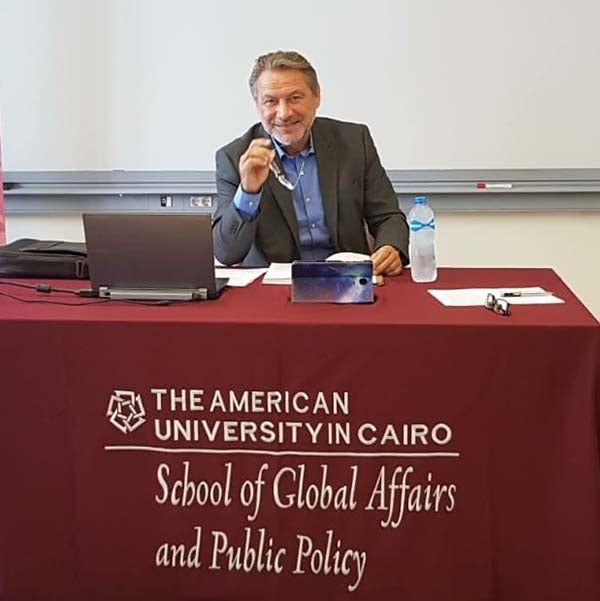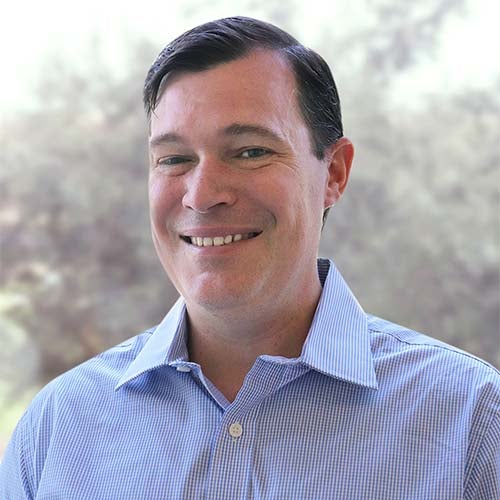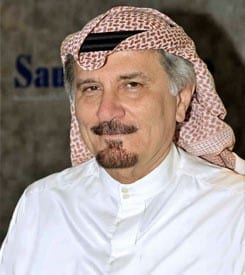Turkey, Egypt and Saudi Arabia: The New Middle East
By James La Pierre Cutts | February 26, 2020
UCF will release a new publication in partnership with the Middle East Institute regarding competition and cooperation between the regional powers.
At Tuesdays event, “Turkey, Egypt and Saudi Arabia: The New Middle East” from left to right: Hakan Özoğlu (UCF), Gönül Tol (George Washington), David Dumke (UCF), and Robert Mogielnicki (University of Oxford).
UCF welcomed Dr. Gönül Tol and Dr. Robert Mogielnicki to campus February 4th. The two scholars are working on a book with David Dumke, at the Director of the Office of Global Perspectives and International Initiatives and Dr. Hakan Özoğlu, a professor for History and the Director of Direct of Middle Eastern Studies at UCF. The quartet’s book “The Modern Middle East” discusses Turkey, Saudi Arabia, and Egypt’s newfound role in the Middle East after U.S involvement in the region has diminished. They also discuss the role of both secularism and religion in the region, and how partnerships and rivalries are based off these ideologies. The discussion also surrounded the Political economy of the three nations, highlighting the surprising lack of economic ties between them. Look out for their new publication, which will soon be available in Amazon.
New UCF, Moroccan University Partnership to Develop Exchange Programs
By Gene Kruckemyer ’73 | October 4, 2018

UCF and Al Akhawayn University in Morocco signed a memorandum of understanding Thursday creating an international partnership to promote faculty exchanges, joint classes, research and other activities.
The agreement was signed by UCF President Dale Whittaker and AUI President Driss Ouaouicha at the FAIRWINDS Alumni Center before a contingent of visiting dignitaries from Morocco, including Princess Lalla Joumala Alaoul, who is Morocco’s ambassador to the United States, and 15 traveling Moroccan journalists covering the story.
“AUI and UCF have much to gain by working together.” – UCF Provost Elizabeth Dooley.
AUI and UCF have much to gain by working together, particularly by offering our students and faculty an amazing opportunity to build sustainable relationships,” said UCF Provost Elizabeth Dooley.
The agreement has been in the works about a year since UCF co-sponsored a conference in Casablanca, Morocco, on water, energy and food security. Afterward, the UCF contingent visited the AUI campus in the town of Ifrane.
That visit to Morocco was followed up by another joint conference at UCF sponsored by the two institutions.
Read More
UCF Experts Speak in Cairo, Launch Faculty-Expert Exchange

The American University in Cairo recently hosted events at their New Cairo campus featuring UCF’s Hakan Ozoglu, Ph.D. and David Dumke.
Dr. Ozoglu, a professor in the Department of History and Chairman of the Middle East Studies Program, spoke about the transition from the Ottoman Empire to Turkish Republic. Dumke, Director of the Prince Mohammad Bin Fahd Program for Strategic Research and Studies (PMBF) and Middle East Initiatives, discussed the American political landscape and how the November midterm elections could change U.S. foreign policy.
The Cairo talks also marked the start of a new faculty exchange initiative between the PMBF Program and AUC’s Prince Alwalid Bin Talal Bin Abdulaziz Alsaud Center for American Studies (CASAR).
We want to thank AUC for arranging our visit. Dr. Ozoglu and I were impressed by the interest of the AUC community on topics both historic and current. And, as is the often the case, we learned a great deal from the questions we were asked. We are also pleased that our visit will help open the doors for others at UCF to listen, learn, and talk about the issues that draw our nations together,” said Dumke.
Read More
Hakan Ozoglu, Ph.D.

Hakan Özoğlu’s previous research focuses on Kurdish Nationalism in the Ottoman Empire. His book was titled Kurdish Notables and the Ottoman State. The Turkish edition of the book came out in 2004. Özoğlu’s main aim in this project was to understand the process of identity formation and emergence of nationalism. His research interests include the power struggle in modern Turkish Republic after WWI and US involvement of the Middle East through Turkey after the Great War. His latest book deals with the tension between the secularists and the Islamists and with the Kemalist project to tame the political opposition in an attempt to westernize the remnant of the last “Islamic Empire.” His book From Caliphate to Secular State is released by Praeger Press in 2011. He is currently the Director of Middle Eastern Studies Minor. Currently he is working on a book manuscript on “Admiral Mark Lambert Bristol’s Tenure in Turkey.” His interviews and essays have appeared in many international media outlets including, New York Times, Orlando Sentinel, Chicago Tribune, WTTW PBS Chicago . He is the recipient of 2017-18 Fulbright Core Fellowship.
After spending the past year conducting research in Turkey, he is back in Orlando, and will provide updates on Turkey’s political landscape, including the increased tension between Ankara and Washington.
Photos of the event can be found here.
PMBF Director Speaks at House of Lords

The Prince Mohammad Bin Fahd Program for Strategic Research & Studies continues to work through a busy summer schedule, highlighted by a presentation to the Parliament of the United Kingdom by PMBF Director David Dumke. Dumke was a guest of the Right Honorable Lord Ahmed of Rotherham. He spoke to the House of Lords on July 9 about diplomacy and protocol in the Islamic world.
“It was an honor to speak to such an august audience at such a distinguished setting. It is always important to discuss key issues, and understanding how others see and interact with the world is important to decision-makers in the West, be they in London, Washington, Tallahassee or elsewhere,” noted Dumke.
Dumke spoke at a special symposium organized and moderated by Lord Ahmed, and was joined by several other notable experts. The symposium, “Diplomacy and Protocol in Islam,” was timed around the publication of a book with a similar title written by Saudi Prince Faisal bin Mishal bin Saud Al Saud. The Prince has written a series of books about Islam and Saudi governance. He currently is governor of Al Qassim Region. Prince Faisal has long been supportive of UCF’s efforts to build relations in Saudi Arabia.
Lord Ahmed, who in 1998 became the first Muslim appointed to the House of Lords, has worked continuously to promote understanding of Islam and build bridges between the West and Islamic worlds. This includes numerous undertakings in the United States to support programs like UCF’s PMBF Program.
“We are appreciative of Lord Ahmed for providing us a platform to not only discuss and debate important concepts, but to promote UCF’s efforts to increase knowledge and awareness. We look forward to future events and would welcome working with Parliament in the future,” added Dumke.
The London event was cosponsored by NAAM Association, a non-government organization devoted to cultural dialog which is headed largely by Saudi civic and business leaders. NAAM often partners with other non-government organizations to accomplish dialog and social development goals.
In addition to the House of Lords, PMBF participated in a series of international events on Middle East-related issues this summer. This included three events in Washington, DC, and a conference in Madrid, Spain. Topics ranged from water and food security issues to U.S. relations with Egypt and Saudi Arabia.
For additional information about the PMBF Program, please contact Kinda Haddad at kinda.haddad@ucf.edu, or by calling (407) 823-2510.
Photos of the event can be found here.
UCF & PMU to Sponsor Conference on Saudi Arabia

The University of Central Florida and Prince Mohammad Bin Fahd University will host “The Impact of Social and Economic Reforms on Saudi Youth” January 17-18, 2019, in Orlando. The conference will be held at the UCF Student Union, Pegasus Ballroom, and is being organized by the UCF Prince Mohammad Bin Fahd Program for Strategic Research and Studies.
The conference will focus on the Saudi Vision 2030 plan, which calls for the Kingdom to decrease its dependence on oil, diversify its economy, and increase employment opportunities for Saudi citizens – particularly the youth which comprise a high percentage of the population. It is hoped the 2030 reforms will further develop public service sectors such as health, education, recreation, tourism, and infrastructure. Reforms are also creating new areas in which U.S. and Saudi businesses, universities, institutions, and individuals can cooperate. The conference will permit educators, practitioners, students, and members of the business community to participate in an innovative and interdisciplinary discussion focusing on the impact of reforms, particularly on the sizable youth population.
“The conference will provide a unique and timely platform to discuss the changes that are underway in the Kingdom, and crucially their transformative impact on Saudi youth. This is the key demographic bloc in the Kingdom. There are also enormous business, educational, and cultural opportunities in working with younger Saudis, which Vision 2030 recognizes. We feel it is important to have this conversation in Central Florida so we understand the changes and their potential for Saudis and for Americans,” noted PMBF Director David Dumke.
The conference will feature Saudi and American speakers, including UCF and PMU faculty, from a variety of academic and business fields. In a series of panels, coupled with special addresses, experts will highlight the design, implementation, and expected results of ongoing reforms, the roles and responsibilities of stakeholders, and opportunities and challenges. The conference is designed to be interactive, and the audience will include students, faculty, and members of the businesses community.
UCF and PMU are calling for papers from prospective participants on a range of topics, including:
Saudi economic diversification (role of private sector, FDI)
Resource management (water, agriculture & food, energy, environmental protection)
Education sector (Saudi education investments, growth of public and private educational institutions, producing a globally competitive workforce)
Role of the Saudi youth in economic development (including entrepreneurship)
Role of the Saudi youth/cultural dimensions
Balancing Change & Tradition (role of women, role of Islam, social media influence)
New sectors (tourism, sports and entertainment sector)
US-Saudi educational cooperation (at student and institutional level, collaborative research, medical education)
Future of the energy sector and sustainability
Models for sustainable development (smart cities, urban landscape, infrastructure)
Developing a space program
Future of US-Saudi relations
Saudi Arabia’s regional role (what is the “new order” in the Middle East?, future of the Gulf, evolving American regional role)
Security cooperation (war on terrorism/extremism, military to military cooperation, cybersecurity and emerging threats)
Those who submit papers are welcome to participate as panelists at the conference. All accepted papers would be published in the Online Conference Proceedings with dedicated ISBN Number. We would ask those interested to let conference organizers know in advance (see contact information below). Papers must be submitted by Monday, December 10, 2018.
Established in 2006, PMU is a private, co-ed university in Al Khobar, Saudi Arabia. As a fast growing technology-driven institution of higher learning, PMU has adopted a highly innovative student-centered approach to education which offer students a chance to develop skills they will need for tomorrow’s workforce. With state of the art facilities, PMU has four colleges including Engineering, Information Technology, Business Administration, and Sciences & Human Studies. For more information, please go to https://www.pmu.edu.sa/.
UCF and PMU have a longstanding partnership, embodied by the PMBF Program. Established in 2012, the Program sponsors or co-sponsors public presentations by distinguished scholars and practitioners, student fellowships, and research activities. The Program is house in the UCF College of Sciences. For more information, please go to https://sciences.ucf.edu/pmbfprogram/about/.
For more information on the conference or submitting a paper, PMU, or the PMBF Program, please contact Kinda Haddad at kinda.haddad@ucf.edu, or by calling 407-823-2510.
Middle East Institute Hosts PMBF’s Almaeena

Veteran Saudi journalist and foreign policy analyst Khaled Al Maeena, Senior Nonresident Fellow for Prince Mohammad Bin Fahd Program for Strategic Research & Studies, was the featured speaker at an event hosted by the Middle East Institute in Washington, DC on August 15. The PMBF Program and NAAM Association cosponsored the event which focused on Saudi Arabia’s foreign policy and implementation of the 2030 national development.
There has been considerable discussion over the past year about Saudi Arabia’s ongoing economic and social reforms, which have been championed by Crown Prince Mohammed Bin Salman. Al Maeena stressed that the changes taking place were absolutely necessary for the Kingdom’s survival. In fact, the Kingdom’s over-reliance on oil, inability to create enough jobs or provide opportunities for the large youth population, and unwillingness to address women’s issues was a growing liability. Thus, the 2030 era of reforms were badly needed and have been very popular with the Saudi public.
Al Maeena also discussed Riyad’s foreign policy, including relations with the Gulf, the broader Middle East, and Washington. He answered difficult questions about a number of serious foreign policy challenges, including the ongoing war in Yemen, the blockade of Qatar, the recent diplomatic spat with Canada, as well as Iran, Iraq, and Syria. He noted that Riyadh has had to adopt a new, assertive leadership role in the evolving region to meet a growing number of threats. Ultimately, the Kingdom hopes to work with Washington to foment regional stability and order.
The event, “2030 Saudi Arabia: A Conversation with Khaled Al Maeena,” was moderated by Ambassador (retired) Gerald Feierstein, Director of Government Relations, Policy, and Programs and the Middle East Institute (MEI). Guests included Washington-based foreign policy experts, scholars, and members of the press. MEI is a partnering with UCF’s PMBF Program on a project looking at the future of the Middle East through key regional relationships.
“It is important that Saudi voices are heard by those working on policy at the highest levels in Washington. Khaled Al Maeena is a respected, independent voice on Saudi Arabian domestic and foreign policy matters. We are pleased to keep working with MEI to promote understanding of the Kingdom,” stated PMBF Director David Dumke.
The Washington event was also cosponsored by NAAM Association, a non-government organization devoted to cultural dialog which is headed largely by Saudi civic and business leaders. NAAM often partners with other non-government organizations, including the UCF PMBF Program, to accomplish dialog and social development goals.
UCF and its partner, Prince Mohammad Bin Fahd University, will be hosting a conference on Saudi youth, the 2030 plan, and US-Saudi relations in Orlando January 17-18, 2019. For more information on the conference, please go to: https://sciences.ucf.edu/news/ucf-pmu-to-sponsor-conference-on-saudi-arabia/.
For additional information about the PMBF Program, please contact Kinda Haddad at kinda.haddad@ucf.edu, or by calling 407-823-2510.
Photos of the event can be found here.
North Africa Update: Managing Transitions and Stasis
Issandr El Amrani came to UCF April 3rd to discuss the North Africa Region, specifically in regards to current events surrounding Libya, Tunisia, and Morocco. Issandr El Amrani oversees Crisis Group’s North Africa Project. Prior to joining Crisis Group, he was a writer and consultant on Middle Eastern affairs based in Cairo. His reporting and commentary on the region has appeared in The Economist, London Review of Books, Financial Times, The National, The Guardian, Time and other publications. The fallout from the Arab Spring, Egyptian president Sisi’s second term, and Libya’s impact on the European migrant crisis were some of the topics that were discussed. After the discussion, Issandr had a small discussion with students from the International Relations Club about his career and how to follow in his path.
Photos of the event can be found here.
Food and Water Security in the MENA Region
We had the pleasure of hosting a panel discussion on March 8th between Dr. Peter Jacques, Michael Carroll, and Dr. Thomas Crisman on the topic of food and water security in the Middle East and North Africa Region, moderated by PMBF Program Director David Dumke. Dozens of students came out to learn more about the Nexus, which is the term for the various intersections of food, water, and energy security. Some topics discussed were how programs implemented in the region are applied globally in places like Central Asia and the American Southwest and how instability of these resources can lead to interstate conflicts.
Photos of the event can be found here.
